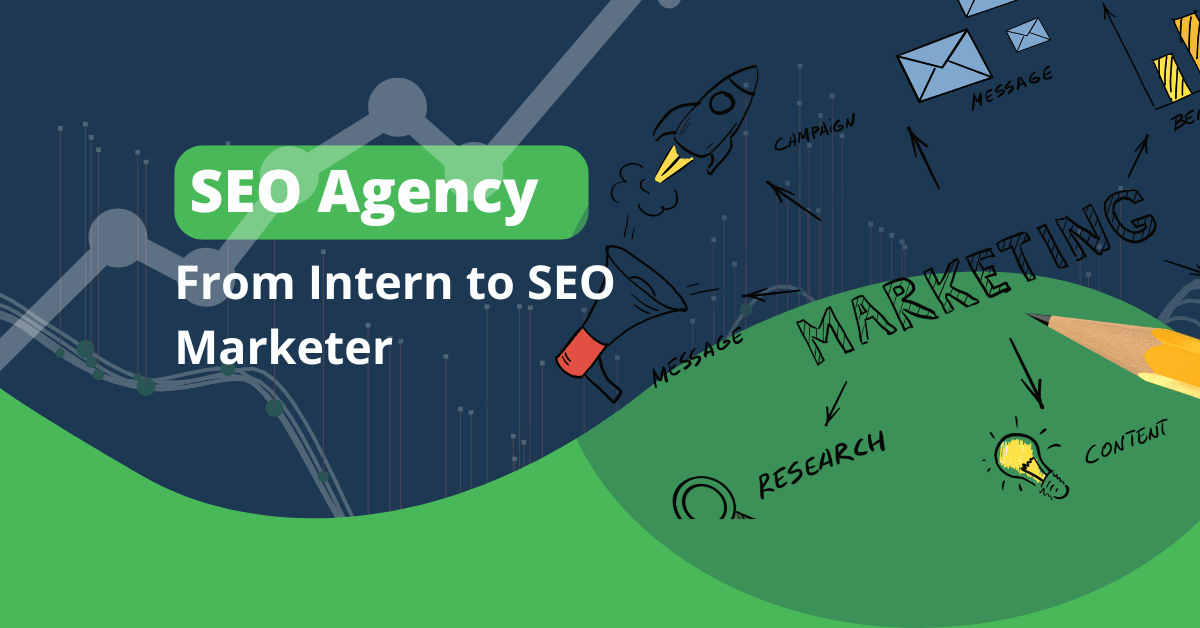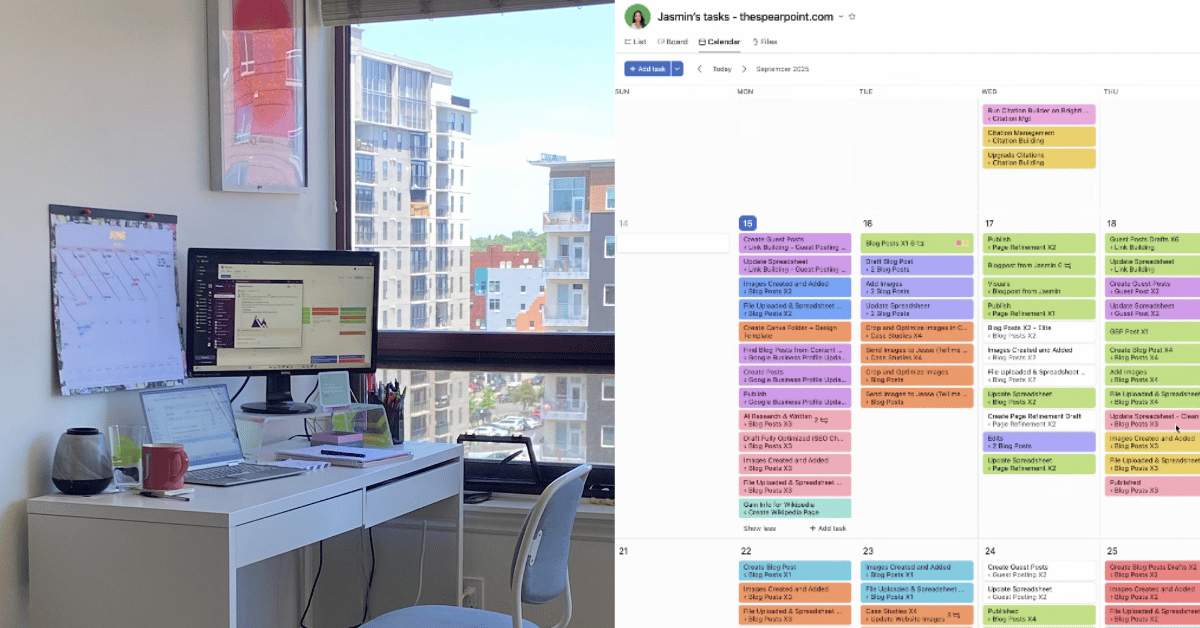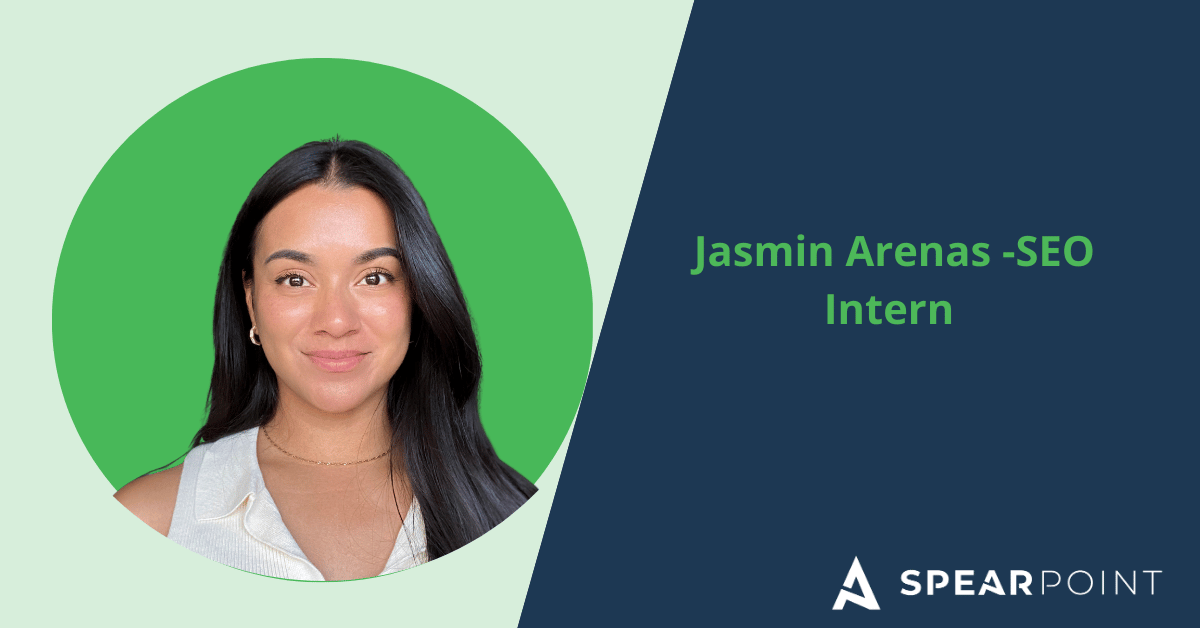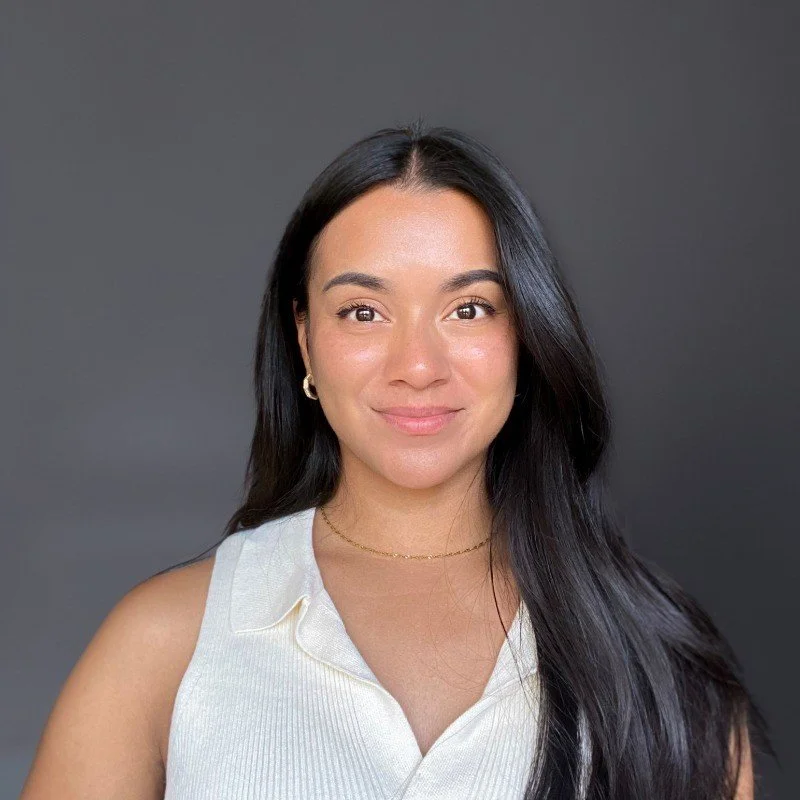SEO Agency: From Intern to SEO Marketer by Jasmin Arenas
Hi, I’m Jasmin, a SpearPoint intern and a recent marketing grad from Metropolitan State University who, like most people my age, has been fascinated by social media marketing, tracking trends, analyzing engagement, and thinking about what makes content go viral. But I’ve always been more interested in the mechanics behind the scenes, specifically SEO. There’s something powerful about how the right strategy, keywords, and links can help a business actually be found by the people who need it most.
What excites me even more is how AI is transforming SEO and digital marketing. I don’t want to be a spectator, I want to be part of the evolution, helping businesses grow in smarter, faster, more measurable ways. Jumping into an SEO agency right after college seemed like the perfect way to do just that.
Also read:
The Hiring Process: How I Landed the Role
Starting your first full-time role after graduation can feel intimidating. You’ve studied the concepts, completed projects, and built your skills, but stepping into a professional environment is a different challenge entirely.
In my case, I was fortunate to begin as an intern at the agency before graduating. This experience allowed me to demonstrate my abilities on real client projects, learn the fundamentals of SEO, and develop my skills in a practical setting. One of the things I quickly realized about working at an agency is that you don’t just focus on one part of marketing, you get to see the entire process. From understanding client goals and researching industries, to creating content, optimizing it for search, and analyzing performance, it’s all connected. This perspective is invaluable, especially early in a marketing career.
Looking back, what stands out most about working at an agency is the variety and scope of the work. You quickly learn that marketing isn’t just one thing you get to wear many hats, see how all the pieces fit together, and understand the bigger picture. It’s been invaluable for my growth as a marketer and is especially great for someone who’s trying to figure out what type of marketing they want to focus on.
(Image: My workstation on the left, my Project Management Calendar in Asana on the right.)
The First 90 Days
The first thing I learned: SEO isn’t just “writing blogs with some keywords sprinkled in.” It’s strategy. It’s research. It’s learning how to talk about industries you didn’t even know existed.
Here’s what my first three months looked like:
Fitness: I made an SEO checklist for guest posts and started a blog about preventing workout injuries in Colorado. (Spoiler: don’t skip your warm-ups.)
Construction: Helped define ELITE Construction’s audience and wrote a 2,500-word blog about hospitality renovations. I never thought I’d know this much about hotel remodeling, but here we are.
Law Firms: Wrote about workers’ comp, tendon injuries, and hit-and-runs. Basically, I learned how to write like a lawyer without actually being one.
Finance & IT: For BlueBird Advisory, I wrote about financial planning after selling a home. For Tekkis (cybersecurity/IT), I tackled how dental practices can build patient trust. Niche? Absolutely.
Energy & Team Building: One week I was writing about energy sector consulting, the next about avoiding awkward small talk at team-building events. Range, right?
By August, I was juggling clients in construction, law, IT, fitness, energy, and even boating. If you ever peeked at my Google search history, you’d think I was either a lawyer, contractor, or dentist.
The Highs
Seeing my work live. Nothing beats finding one of my blogs published on a client’s site.
Variety. I get bored easily but this role doesn’t give me the chance. One day it’s law, the next it’s cybersecurity.
Trust. Being handed big projects so early on (like 2,000+ word blogs) showed me my boss trusted me to deliver. That felt good.
The Lows
The learning curve. SEO is way more technical than I thought. Anchor text, pillar pages, backlinks… my first few weeks were overwhelming.
Imposter syndrome. Writing about workplace harassment lawsuits in Oregon? I caught myself thinking, “Am I even allowed to write this?” But research + edits got me through.
Edits. Speaking of edits, they can sting. Seeing a doc full of comments isn’t fun but it’s how I improved the fastest.
What I’ve Learned
SEO isn’t shortcuts. It’s not about tricking Google, it's about writing for real people and connecting with them.
Every industry has its own voice. And you have to learn it quickly.
Details matter. The right anchor text, the right tone, the right length it all adds up.
Growth = discomfort. The projects that intimidated me the most ended up being the ones I’m most proud of.
Where I’m At Now
Three months in, I’ve learned more than I expected, not just about SEO, but about myself. I learned that I actually like the challenge of switching between industries. I learned that I can handle more responsibility than I thought. And I learned that marketing is way more powerful when it’s rooted in strategy, not guesswork.
This first role has already given me so many building blocks for the marketer I want to become. And while the learning curve is steep, I wouldn’t trade it.
Because let’s be real: it feels pretty good to see something you wrote show up in search results.
Conclusion
Marketing isn’t just social media trends and catchy content it’s also the backbone that helps businesses get found in the first place. That’s where SEO comes in. For me, stepping into this “backend” side of marketing has been eye-opening, challenging, and honestly, a lot more rewarding than I expected. If you’re looking for a way to make a real impact in digital marketing, SEO might just be the path for you too.
About the Author
Jasmin Arenas
SEO & Content Marketing Intern at SpearPoint Marketing, Jasmin is diving deep into the evolving world of digital strategy where AI meets SEO. With a passion for writing, search trends, and learning what drives visibility, she supports brands as they navigate content in the age of ChatGPT and beyond.




